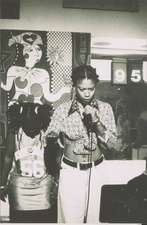Hip–Hop Japan – Rap and the Paths of Cultural Globalization
Autor Ian Condryen Limba Engleză Paperback – 31 oct 2006
Preț: 261.38 lei
Nou
Puncte Express: 392
Preț estimativ în valută:
50.01€ • 52.36$ • 41.38£
50.01€ • 52.36$ • 41.38£
Carte tipărită la comandă
Livrare economică 05-19 aprilie
Preluare comenzi: 021 569.72.76
Specificații
ISBN-13: 9780822338925
ISBN-10: 0822338920
Pagini: 264
Ilustrații: 11 b&w photographs, 4 figures
Dimensiuni: 164 x 234 x 16 mm
Greutate: 0.39 kg
Editura: MD – Duke University Press
Locul publicării:United States
ISBN-10: 0822338920
Pagini: 264
Ilustrații: 11 b&w photographs, 4 figures
Dimensiuni: 164 x 234 x 16 mm
Greutate: 0.39 kg
Editura: MD – Duke University Press
Locul publicării:United States
Recenzii
From New York to Rio, from Nairobi to Tokyo, hip-hop, more than any other musical genre or youth culture, has permeated nations, cultures, and languages worldwide. Essential to the contributions by anthropologists and hip-hop scholars on the globalization of hip-hop is Ian Condrys Hip-hop Japan: rap and the paths of cultural globalization. In this depiction of how Japanese youth nationalize the American hip-hop import, Condry questions disciplinary dichotomies such as global/local within a unique contemporary ethnographic approach that seeks to place performance as a key factor in the construction of culture.... Condrys presentation of genba globalization is the strong point of his ethnography and offers an enlightening analysis of the anthropology of performance. - Melisa Riviere, Journal of the Royal Anthropological Institute, 2012
I found Hip-Hop Japan fascinating. Ian Condry writes with both authority and intimacy. Taking on the movement of musicians, CDs, soundtracks, graffiti, breakdancing, fashion, racialized culture, style, musical genre, lyrics, and history from the United States to Japan, he offers a groundbreaking transcultural study of popular culture explored through an ethnography of the local.--Anne Allison, author of Millennial Monsters: Japanese Toys and the Global Imagination
Ian Condrys book moves masterfully between ground-level observation of the Japanese hip-hop scene and sharp insight into the global flows of cultural influence. His analysis of the urban spaces in which Japanese hip-hop culture unfolds is fascinating and smart. So, too, is the books careful mapping of hip-hops place within the complex history of Japanese popular music since World War II. Condry is one of the handful of writers breathing new life into popular music ethnography with lively, evocative writing and a firm grasp of contemporary cultural theory.--Will Straw, author of Cyanide and Sin: Visualizing Crime in 50s America
" . . . Ian Condry's years of contact with the main players in Japanese hiphop allow him to create a keenly observed oral history of rap in Japan from its very earliest days, and the story is longer and more complex than might be expected. . . . Hip Hop Japan is initially academic in focus, but Condry has done his research in clubs and the studios, and as a result it's of considerably wider interest."--The Wire, December2006
"What comes over most clearly is Condry's clear enthusiasm for his subject and dedication to his cause. He foregrounds his study with a detailed history of post-war Japanese pop from jazz via Beatles copycat bands through to the birth of hip-hop in the early 1980s. . . The result is comprehensive and highly readable."--Times Higher Education Supplement
"From New York to Rio, from Nairobi to Tokyo, hip-hop, more than any other musical genre or youth culture, has permeated nations, cultures, and languages worldwide. Essential to the contributions by anthropologists and hip-hop scholars on the globalization of hip-hop is Ian Condry's Hip-hop Japan: rap and the paths of cultural globalization. In this depiction of how Japanese youth nationalize the American hip-hop import, Condry questions disciplinary dichotomies such as global/local within a unique contemporary ethnographic approach that seeks to place 'performance' as a key factor in the construction of culture... Condry's presentation of genba globalization is the strong point of his ethnography and offers an enlightening analysis of the anthropology of performance." - Melisa Riviere, Journal of the Royal Anthropological Institute, 2012 "I found Hip-Hop Japan fascinating. Ian Condry writes with both authority and intimacy. Taking on the movement of musicians, CDs, soundtracks, graffiti, breakdancing, fashion, racialized culture, style, musical genre, lyrics, and history from the United States to Japan, he offers a groundbreaking transcultural study of popular culture explored through an ethnography of the local."--Anne Allison, author of Millennial Monsters: Japanese Toys and the Global Imagination "Ian Condry's book moves masterfully between ground-level observation of the Japanese hip-hop scene and sharp insight into the global flows of cultural influence. His analysis of the urban spaces in which Japanese hip-hop culture unfolds is fascinating and smart. So, too, is the book's careful mapping of hip-hop's place within the complex history of Japanese popular music since World War II. Condry is one of the handful of writers breathing new life into popular music ethnography with lively, evocative writing and a firm grasp of contemporary cultural theory."--Will Straw, author of Cyanide and Sin: Visualizing Crime in 50's America " ... Ian Condry's years of contact with the main players in Japanese hiphop allow him to create a keenly observed oral history of rap in Japan from its very earliest days, and the story is longer and more complex than might be expected... Hip Hop Japan is initially academic in focus, but Condry has done his research in clubs and the studios, and as a result it's of considerably wider interest."--The Wire, December 2006 "What comes over most clearly is Condry's clear enthusiasm for his subject and dedication to his cause. He foregrounds his study with a detailed history of post-war Japanese pop from jazz via Beatles copycat bands through to the birth of hip-hop in the early 1980s... The result is comprehensive and highly readable."--Times Higher Education Supplement
I found Hip-Hop Japan fascinating. Ian Condry writes with both authority and intimacy. Taking on the movement of musicians, CDs, soundtracks, graffiti, breakdancing, fashion, racialized culture, style, musical genre, lyrics, and history from the United States to Japan, he offers a groundbreaking transcultural study of popular culture explored through an ethnography of the local.--Anne Allison, author of Millennial Monsters: Japanese Toys and the Global Imagination
Ian Condrys book moves masterfully between ground-level observation of the Japanese hip-hop scene and sharp insight into the global flows of cultural influence. His analysis of the urban spaces in which Japanese hip-hop culture unfolds is fascinating and smart. So, too, is the books careful mapping of hip-hops place within the complex history of Japanese popular music since World War II. Condry is one of the handful of writers breathing new life into popular music ethnography with lively, evocative writing and a firm grasp of contemporary cultural theory.--Will Straw, author of Cyanide and Sin: Visualizing Crime in 50s America
" . . . Ian Condry's years of contact with the main players in Japanese hiphop allow him to create a keenly observed oral history of rap in Japan from its very earliest days, and the story is longer and more complex than might be expected. . . . Hip Hop Japan is initially academic in focus, but Condry has done his research in clubs and the studios, and as a result it's of considerably wider interest."--The Wire, December2006
"What comes over most clearly is Condry's clear enthusiasm for his subject and dedication to his cause. He foregrounds his study with a detailed history of post-war Japanese pop from jazz via Beatles copycat bands through to the birth of hip-hop in the early 1980s. . . The result is comprehensive and highly readable."--Times Higher Education Supplement
"From New York to Rio, from Nairobi to Tokyo, hip-hop, more than any other musical genre or youth culture, has permeated nations, cultures, and languages worldwide. Essential to the contributions by anthropologists and hip-hop scholars on the globalization of hip-hop is Ian Condry's Hip-hop Japan: rap and the paths of cultural globalization. In this depiction of how Japanese youth nationalize the American hip-hop import, Condry questions disciplinary dichotomies such as global/local within a unique contemporary ethnographic approach that seeks to place 'performance' as a key factor in the construction of culture... Condry's presentation of genba globalization is the strong point of his ethnography and offers an enlightening analysis of the anthropology of performance." - Melisa Riviere, Journal of the Royal Anthropological Institute, 2012 "I found Hip-Hop Japan fascinating. Ian Condry writes with both authority and intimacy. Taking on the movement of musicians, CDs, soundtracks, graffiti, breakdancing, fashion, racialized culture, style, musical genre, lyrics, and history from the United States to Japan, he offers a groundbreaking transcultural study of popular culture explored through an ethnography of the local."--Anne Allison, author of Millennial Monsters: Japanese Toys and the Global Imagination "Ian Condry's book moves masterfully between ground-level observation of the Japanese hip-hop scene and sharp insight into the global flows of cultural influence. His analysis of the urban spaces in which Japanese hip-hop culture unfolds is fascinating and smart. So, too, is the book's careful mapping of hip-hop's place within the complex history of Japanese popular music since World War II. Condry is one of the handful of writers breathing new life into popular music ethnography with lively, evocative writing and a firm grasp of contemporary cultural theory."--Will Straw, author of Cyanide and Sin: Visualizing Crime in 50's America " ... Ian Condry's years of contact with the main players in Japanese hiphop allow him to create a keenly observed oral history of rap in Japan from its very earliest days, and the story is longer and more complex than might be expected... Hip Hop Japan is initially academic in focus, but Condry has done his research in clubs and the studios, and as a result it's of considerably wider interest."--The Wire, December 2006 "What comes over most clearly is Condry's clear enthusiasm for his subject and dedication to his cause. He foregrounds his study with a detailed history of post-war Japanese pop from jazz via Beatles copycat bands through to the birth of hip-hop in the early 1980s... The result is comprehensive and highly readable."--Times Higher Education Supplement
Notă biografică
Ian Condry is Associate Professor of Japanese cultural studies in Foreign Languages and Literatures at the Massachusetts Institute of Technology. Visit Ian Condry's website.
Textul de pe ultima copertă
"Ian Condry's book moves masterfully between ground-level observation of the Japanese hip-hop scene and sharp insight into the global flows of cultural influence. His analysis of the urban spaces in which Japanese hip-hop culture unfolds is fascinating and smart. So, too, is the book's careful mapping of hip-hop's place within the complex history of Japanese popular music since World War II. Condry is one of the handful of writers breathing new life into popular music ethnography with lively, evocative writing and a firm grasp of contemporary cultural theory."--Will Straw, author of "Cyanide and Sin: Visualizing Crime in 50s America"
Cuprins
References 235
Index 247
Acknowledgments ix
Introduction: Hip-Hop, Japan, and Cultural Globalization 1
1. Yellow B-Boys, Black Culture, and the Elvis Effect 24
2. Battling Hip-Hop Samurai 49
3. Genba Globalization and Locations of Power 87
4. Rap Fans and Consumer Culture 111
5. Rhyming in Japanese 134
6. Women Rappers and the Price of Cutismo 164
7. Making Money, Japan-Style 181
Conclusion: Lessons of Hip-Hop Globalization 205
Notes 221
Index 247
Acknowledgments ix
Introduction: Hip-Hop, Japan, and Cultural Globalization 1
1. Yellow B-Boys, Black Culture, and the Elvis Effect 24
2. Battling Hip-Hop Samurai 49
3. Genba Globalization and Locations of Power 87
4. Rap Fans and Consumer Culture 111
5. Rhyming in Japanese 134
6. Women Rappers and the Price of Cutismo 164
7. Making Money, Japan-Style 181
Conclusion: Lessons of Hip-Hop Globalization 205
Notes 221
Descriere
An ethnography of hip-hop performance and culture in Japan.















